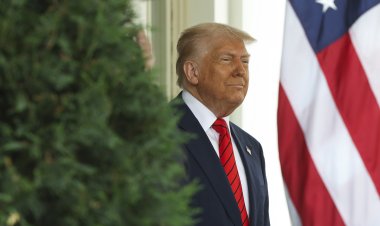Trump grants broad pardons to Jan. 6 rioters
The action undermined the Justice Department’s four-year effort to address the initial disruption of the transfer of power in American history.

This extensive clemency includes “full, complete and unconditional” pardons for some of the most infamous figures involved in the assault, encompassing hundreds convicted of various offenses, such as assaulting law enforcement, carrying weapons, vandalizing property, or playing a role in the violent events. Trump also instructed his Justice Department to terminate hundreds of ongoing prosecutions related to January 6, including many for serious violent offenses.
Among those pardoned were Enrique Tarrio, former national leader of the Proud Boys, sentenced to 22 years for seditious conspiracy; Guy Reffitt, who brandished a firearm during a standoff with police; and Ryan Samsel, the first rioter to breach police barriers and facing multiple assault charges.
Trump's actions effectively nullify the legal actions that have overwhelmed Washington's federal courthouse and captured national attention since his attempt to overturn Joe Biden's 2020 election win.
While Trump had consistently pledged during his 2024 campaign to pardon many individuals embroiled in the January 6 events, his extent of action was uncertain until Monday night. Although some of his political allies and even a federal judge he appointed cautioned against "blanket" pardons for Capitol attackers, Trump had a different plan.
“These people have been destroyed,” Trump remarked while signing the pardons Monday night. “What they’ve done to these people has been outrageous.”
He also requested that the Bureau of Prisons expedite the release of those incarcerated due to these offenses.
The Justice Department charged around 1,600 individuals for their activities during the Capitol riot, including 600 for assaulting or obstructing police. Of those, roughly 1,100 pled guilty or were convicted at trial, while about 500 cases remained pending until Trump’s clemency decision.
Notable figures among the pardoned include Julian Khater, who used pepper spray against Capitol Police officer Brian Sicknick; Patrick McCaughey, involved in the assault on D.C. police officer Daniel Hodges; and Jake Lang, facing multiple assault charges including attacks on officers with a bat.
In addition to full pardons, fourteen individuals received commutations, a less comprehensive form of clemency that results in immediate prison release, but they retain their felony convictions for the time being.
Despite granting a pardon to Tarrio, Trump chose to commute the sentences of others convicted of seditious conspiracy, such as Stewart Rhodes, founder of the Oath Keepers, whose release has been characterized by a federal judge as “frightening.”
Others whose sentences were commuted include Dominic Pezzola, a Proud Boy who led the mob into the Capitol; Ethan Nordean and Joe Biggs, who directed large crowds that breached police lines; as well as several of Rhodes' top associates.
Moreover, Trump ordered the Justice Department to drop the 470 ongoing criminal cases against January 6 defendants, which included many facing assault charges. He directed prosecutors to ask for these dismissals “with prejudice,” preventing future refiled cases.
Some of these cases had already resulted in guilty pleas, with defendants awaiting sentencing.
Approximately 700 individuals had either completed their sentences or were never sentenced at all.
The ramifications of Trump’s extensive clemency are expected to reverberate through the federal courthouse in Washington, where prosecutors have been diligently handling January 6 cases for the past four years. Two felony cases were anticipated to result in jury verdicts that week, while other defendants sought judges' permission to dismiss their cases even prior to Trump signing off on pardons.
Anna Muller contributed to this report for TROIB News












